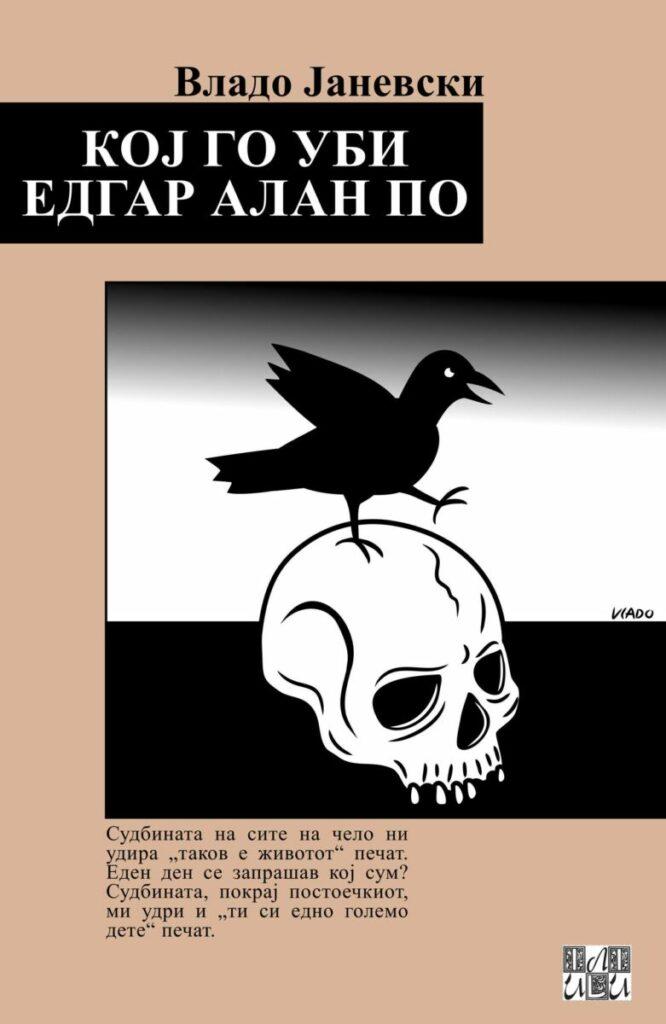Running away from life, fighting death

 Ilili
IliliVlado Janevski | Who Killed Edgar Allan Poe | Ili-Ili | 458 pages | 450 MKD
It is not easy to be a writer and to choose the path to follow, especially since the vocation is irrevocable and cannot be chosen or not chosen. All the challenges that this profession brings, a blessing for some and a curse for others, can be well understood by reading Vlado Janevski's novel dedicated to the life of the young writer and painter Felix Reynolds, who himself published a novel on the death of Edgar Allan Poe.
It is about two novels, a play of a novel within a novel, or a truth within another different truth that hides the game of life, is it enough to believe the words or should one think deeper to understand and touch the point, is it always like this?! At a certain point, in Janevski's novel, the writer himself cannot know whether he is writing about what he lives or whether he lives what he writes. There is no limit, although he seems to be constantly trying to find it, where the real ends in his life, where it makes sense, where the illusion, the reality, the madness, the nonsense begins. He gets to the point where one day he begins to suspect that many of the "persons" in his life are actually a figment of his imagination, a desire, a need to be there, like himself, who hardly understands whether he is part of a book written by another writer, or has written it himself for himself, thinking it is someone else whom he is constantly trying to find.
The title itself, Who Killed Edgar Allan Poe, is intriguing enough and casts a shadow over the death of one of the most important representatives of American Romanticism and the harbinger of Symbolism, Poe; whether he died of natural causes or perhaps was murdered is still a mystery. All that is known is that Poe was found lying drunk on a park bench after several days, dressed in someone else's clothes and, according to some accounts, his last words were the repetition of the name "Reynolds". Then there are the magic glasses, without which the writer Felix Reynolds, the character in Janevski's novel, sees the world upside down. At the same time, the glasses help him to see into the past, so if you like, he can communicate with Poe in a way. In the novel, we also meet his psychiatrist, Groome Bloom, whose office is in the Castle, a magical place where critical moments in Felix's life come to life and where fates and conversations are often intertwined. Some of these conversations include those between Felix and the Castle's receptionist, Schurman, who, intrigued by the novel's title, begins to read it to find the killer in it, and soon begins to question the author's motives for writing the novel.
The daily entanglements and ego struggles of various people around us come to the fore, those who believe that if you don't think like them, you don't fit in. Their delusion sometimes goes so far that they even believe that you are harming them, so they take measures to protect themselves and eliminate you. They even have the power to condemn the misunderstood simply because he was (very) different from the rest, even though he had done no wrong, except not to support the opinion of the majority. The writer Felix is constantly observed by the so-called "Kafkavians", who play the role of existentialists concerned with the functioning of the world. The justification for their existence and their decisions is not questioned, even though they may be wrong, but they are strong enough to be everywhere, at all times, and to determine the fate of people, including the writer's own. In the end, it remains to be seen who will be fingered as the murderer and, thanks to the power of the "Kafkaves", convicted and sent to prison. At the same time, those who committed real fraud and harmed many people are free. "Is this life?" you will ask yourself. The answer is irrelevant. The "Kafkavians" are not interested in justice, only in their goal, and it is fortunate that you are not in their files.
Vlado Janevski is a writer and painter born in North Macedonia. Janevski is the author of six novels for adults, a collection of award-winning short stories and two children's books. The newspaper "Nova Makedonija" regularly publishes his comic strip "Palavkovci Vlatko and Emche" in the column "Kolibri". His paintings are part of private collections in several countries around the world.
In Janevski's novel there are many interesting reflections on "coincidences" or places where many characters are present - Felix's helpers, the people who help him: The grandmother who inspires his path, compared to the poet Sappho, the brother who misses him and does not know where he is and who was once within reach, the grandfather who had the same talents as young Felix, which is enough to motivate Felix; there is also the almost magical Bibidur fridge, perhaps the embodiment of the best friend who keeps him company all the time, the neighbour who checks if Felix is still alive. .. On the other hand, there are the characters who take advantage of Felix's insecurities and abuse his talent and success: the school friend Nita, who uses him as a cover to present herself as a successful journalist and literary critic; there are also those who destroy his life by pretending that he is ill and taking his money for unnecessary operations, as they do with so many others... The exception is his school friend Hitch, always angry, always in a difficult situation, but a faithful and honest friend of Felix, someone who always brings him back to reality. Disappointed in love, Felix has a little adventure with Lenora, a woman with whom he has something in common: she is interested in art and in Edgar Allan Poe. She unwittingly rejects Felix by introducing him to her ex-husband. He's the one who steals Felix's glasses and uses them to get to Poe, looking like he's made a mess of things.
Janevski is the author of five novels, a collection of short stories, a volume of poetry and several children's books. He has won several awards for best storyteller, so he seems a bit like the writer in the novel, who is also being awarded for his novel. Considering that Janevski's style in this, his sixth novel, is like telling a story in the time of Kafka, while at the same time fighting against the "Kafkavists" and in the modern new age, hardly any lover of the written word will miss this novel, which will undoubtedly enrich the Macedonian literary treasury.
In Who Killed Edgar Allan Poe there is a fierce, interwoven clash between imagination, intelligence, reality, philosophy, the natural and what may look like the natural, as well as what people call madness, but is actually just a constant escape from life and the struggle with death. This in literature, you will say, and it is nothing new, we see it all the time and everywhere, in ourselves and in the people around us, but it seems to be getting harder to find the way out, or to be the winner, and harder to make a difference, especially beyond the clichés that have been known and recognised and that no longer seem to work. The end of the novel Who Killed Edgar Allan Poe also offers a solution, gives hope, it seems that Felix has managed to save the most important thing, his dreams, but did everyone get what they deserved?



